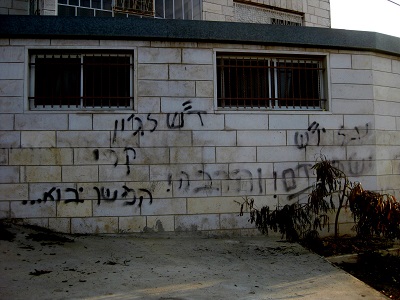
Naming the settler’s hate crimes towards the Palestinians “Price Tag” is to be unfaithful to the truth.
No other word other than terror could describe the outcome of the crime committed by settlers from Beit- El, towards the residents of the Palestinian neighborhood beside which they, the invaders, built their fortified settlement.
Physical, mental and racial terror. (A translation from the definition of terrorism that appears on the Hebrew Wikipedia site: a violent struggle, aimed mainly at citizens, in order to achieve political goals).
It’s not just the writing on the wall or the vehicles that had been torched in the dead of night; it is the fear and helplessness of these people, who together with their property had become prey due to these criminal acts, performed by malicious men from whom they have no protection.
“My heart has already burned”, said Aeisha. She spoke about the on-going harassment from the settlers and said that she didn’t have anywhere else to go to: “not to America, not to Russia and not to China”, because she was born at Al-Abasia from where she was driven away during the Nakba. She grew up here at Dura Al Qara as a refugee. This is where she gave birth and raised her ten children, and now in her old age, once again, her world is tumbling down, once again they try to drive her and her family away.
But Aeisha isn’t going anywhere and no other place is expecting this elder woman whose heart has already burned.
And Jamal, a soft speaking man, talked about the nightmares his children had been having since they woke up during that big fire, and said he didn’t know how to ease their fear and how to rid them of their nightmares.
All he does is add security measures on top of the ones that already existed in his house and property, in preparation for the upcoming assaults.
But neither Aeisha nor Jamal believe this to be the last attack and they know that the outlaws won’t be brought to justice, just as they weren’t brought to justice on previous occasions and they certainly will not be brought to justice on future occasions.
And they, Aeisha and Jamal, like their entire people, know that their property and blood are considered worthless by the army, police and laws that discriminate between human beings.
This is a a video of the burning vehicles taken by Ayad Hadad
During that cold night, on the way back, a dying man was taken from one stretcher to the other at Qalandiya checkpoint, from an ambulance that came from his home city Jenin, to an ambulance that came from Jerusalem.
For these are the regulations of occupation. And regulations, even if they contradict the humane imperative, must be obeyed.
Only his shoes, left vacant of his feet at the entrance to the ambulance, could speak of this person, of who he was, of the road he chose and the one that chose him and of his destination at which he would never arrive.
(Translated by Ruth Fleishman.)
– As a member of Machsomwatch, once a week Tamar Fleishman heads out to document the checkpoints between Jerusalem and Ramallah. This documentation (reports, photos and videos) can be found on the organization’s site: www.machsomwatch.org. The majority of the Spotlights (an opinion page) that are published on the site had been written by her. She is also a member of the Coalition of Women for Peace and volunteer in Breaking the Silence. She contributed this article to PalestineChronicle.com.




